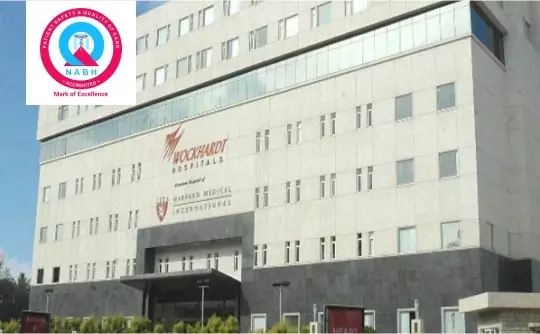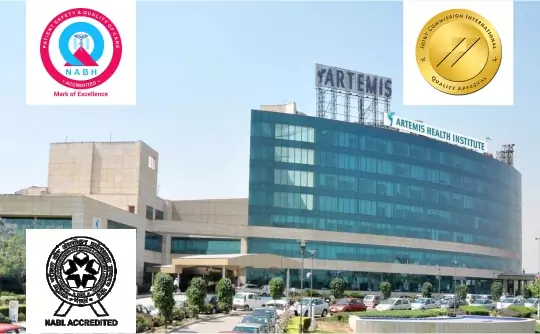

A significant component of the Shoulder Replacement Cost in India is the orthopedic surgeon's fees. IndiCure recommends highly experienced, skilled, board-certified orthopedic surgeons who can deliver excellent results. While the charges may vary based on the surgeon's experience, you can be confident that you are in safe and capable hands when opting for affordable shoulder replacement surgery in India with IndiCure Health Tours.
A substantial part of the total expense for joint replacement surgery in India is attributed to the cost of the shoulder implant itself, which varies based on the materials used. Additionally, using customized surgical instruments or advanced computer technologies contributes to the overall cost. To enhance patient care, new techniques and technologies are frequently incorporated into surgical procedures. While these innovations aim to improve outcomes, they can also lead to higher costs.
Selecting an accredited medical facility with a skilled orthopedic surgeon and qualified medical staff is essential for the success of your shoulder replacement surgery in India. Larger cities in India generally provide superior medical facilities and more experienced surgeons, leading to higher costs. IndiCure Health Tours recommends surgical facilities in these larger cities to prioritize quality of care and ensure patient safety.
The surgery-related expenses include the pre- and post-surgical expenses. The pre-surgical expenses are associated with the age and medical condition of the patient and thus the number and type of investigations required. Post-surgical expenses may include prescription medications and follow-up consultations.
At IndiCure, we consolidate most of the expenses for your shoulder replacement surgery in India to provide you with an inclusive and cost-effective package tailored to your budget and individual requirements. After receiving medical reports, your case manager will provide an estimated cost based on a discussion with the orthopedic surgeon.
The final shoulder replacement surgery cost in India can however be confirmed after your face-to-face consultation with the orthopedic surgeon.

We Help you Choose the Right Treatment, Surgeon & Hospital

We Arrange Video/Telephonic Consultation with the Surgeon

We Assist you with Visa & Accommodation

We Receive you at the Airport and Drop you at Hotel/Hospital

We Assist you the at Hospital & Provide Post Operative Support
IndiCure offers exclusive savings on your medical travel to India. We partner with top hospitals to negotiate special rates, ensuring you get the best possible price on your healthcare when you plan medical travel with us.

Here is a set of questions you should consider asking before commencing your medical tour for shoulder replacement surgery in India.
Prepare to answer questions about your:
The shoulder joint is a ball and socket type of joint. Shoulder replacement surgery, also known as total shoulder arthroplasty, involves replacing the fractured ends of the upper arm bone (humerus) and, in most cases, the shoulder bone (scapula) with artificial implants to relieve pain and restore range of motion.
In individuals with end-stage shoulder arthritis, shoulder replacement is a highly beneficial operation for reducing pain and restoring mobility. The operation relieves discomfort and aids in the restoration of shoulder motion, strength, and function.
Even though shoulder joint replacement is less prevalent than knee or hip replacement, it is just as effective in relieving joint discomfort.
In the 1950s, the first shoulder replacement surgery was conducted in the United States to address serious shoulder fractures. Over time, shoulder joint replacement has grown to be used for a variety of additional painful shoulder disorders, such as various forms of arthritis.
According to the Agency for Healthcare Research and Quality, about 70,000 people in the United States receive shoulder replacement surgery each year. In comparison, almost 900,000 Americans get knee and hip replacement surgery each year.
Indications of Shoulder Replacement:
Shoulder replacements are of various types. Before making any recommendations, your surgeon will carefully assess your circumstances. They'll talk to you about which sort of replacement is best for you. Do not hesitate to inquire about the type of implant that will be utilized in your case, as well as why that particular option is the best option for you.
The most standard total shoulder replacement involves replacing the arthritic joint surfaces using a metal ball attached to a stem, and a plastic socket.
These components are available in a variety of sizes. They can be glued or pressed into place in the bone. Your surgeon may opt for a non-cemented (press-fit) humeral component if the bone is of acceptable quality.
The humeral component may be implanted with bone cement if the bone is soft. In most situations, bone cement is used to implant an all-plastic glenoid (socket) component.
Patients with bone-on-bone osteoarthritis and healthy rotator cuff tendons are usually good candidates for total shoulder replacement.
Depending on your shoulder's condition, the surgeon may merely replace the ball. Hemiarthroplasty is the name for this treatment.
The surgeon replaces the head of the humerus with a metal ball and stem, identical to the component used in a total shoulder replacement, in a typical hemiarthroplasty. A stemmed hemiarthroplasty is the term for this procedure.
When the humeral head is severely shattered but the socket is normal, some surgeons propose hemiarthroplasty. The following are some more reasons for a hemiarthroplasty:
In some cases, doctors choose between a total shoulder replacement and a hemiarthroplasty in the operating room during surgery.
Total shoulder arthroplasty relieves pain better than hemiarthroplasty in patients with osteoarthritis, according to studies.
Resurfacing hemiarthroplasty includes replacing only the humeral head's joint surface with a cap-like prosthesis that does not have a stem. It provides a bone-preserving alternative to the traditional stemmed shoulder replacement for patients with arthritis of the shoulder. It is recommended in patients where:
Resurfacing hemiarthroplasty eliminates the hazards of component wear and loosening that might arise with traditional complete shoulder replacements in patients who are young or very active. Resurfacing hemiarthroplasty may be easier to convert to total shoulder replacement later, if necessary, because of its more conservative nature.
Reverse total shoulder replacement is a different form of shoulder replacement. People who need a reverse complete shoulder replacement have:
Even with a traditional total shoulder replacement, these people may have pain. They may also find it difficult to raise their arm above a 90-degree angle. It can be extremely debilitating to be unable to move your arm away from your side.
The socket and metal ball are switched in a reverse complete shoulder replacement: The shoulder bone is linked to a metal ball, while the upper arm bone is attached to a plastic socket. This permits the patient to elevate the arm using the deltoid muscle rather than the damaged rotator cuff.
An older patient with severe pain from degenerative shoulder arthritis - pain that hasn't responded to conservative treatment but hasn't substantially reduced the patient's range of motion in the shoulder - is the best candidate for total shoulder replacement surgery.
Patients with bone-on-bone osteoarthritis and healthy rotator cuff tendons are usually good candidates for total shoulder replacement.
The surgeon separates the deltoid and pectoral muscles. One of the front muscles of the rotator cuff, which covers the shoulder, is sliced to open the shoulder. The surgeon may manipulate the arthritic components of the shoulder ball and socket because this "opens the door."
The procedure involves removing the arthritic parts of the joint, and then inserting the implant components: a socket, ball, and stem. The stem is inserted into the patient's humerus and is connected to the metal ball component, allowing for improved joint function and mobility.
Once the rotator cuff muscle incision is closed and patched, the external skin incision area is cleaned to prevent infection and then sutured. To further protect the wound and support the healing process, a sterile bandage is applied. This bandage helps keep the area clean and secure.
The outcomes of shoulder replacement surgery are highly encouraging. Approximately 95% of people who have shoulder replacements are pain-free. Shoulder replacement can help you live a better life by reducing joint pain, increasing your range of motion, and improving your quality of life. It may take a few months before you realize all of the benefits of the procedure.
Patients usually need eight weeks or longer to recover. A patient may not be able to conduct heavy labor or intensive strength exercises for several months. The patient can begin unrestricted, active use of the arm and shoulder in 6-8 weeks. Throughout physical treatment, mobility improves. In two to three weeks, one can return to work.

Mumbai
Wockhardt Hospitals is the branch of the leading Wockhardt pharmaceutical company in India. The company is more than four decades old and is present in more than 20 countries around the globe. Wockhardt has 9 hospitals in India in Mumbai, Nagpur, Rajkot, Nashik, and Surat.

Gurgaon
Artemis Health Institute, a premium multi-specialty hospital is a healthcare venture launched by the promoters of the Apollo Tyres Group. Established in 2007, Artemis was the first hospital in Haryana to get NABH accreditation within 3 years of start-up.
Shoulder replacement is not as commonly performed as knee and hip replacement, but is a very effective procedure. Every year, around 70,000 people in the United States have shoulder replacements.
A metal ball, made of a particular type of stainless steel, is used to replace the humeral ball, which is coupled to a titanium stem to maintain the ball attached to your arm, while a polyethylene cup replaces the glenoid socket.
The shoulder is a huge ball and socket joint, similar to the hip joint. It has a wider range of motion than any other joint in the body. Bones, tendons, muscles, and ligaments make up the shoulder joint, which holds the shoulder in place and allows it to move. The clavicle (collar bone), Scapula (big flat triangular bone called shoulder blade), and Humerus are the bones that make up the shoulder joint (upper arm bone).
The acromioclavicular joint, or A.C. joint, joins the clavicle to your shoulder blade. The clavicle connects your shoulder to your rib cage and keeps it out of the way. The humerus, or upper arm bone, has a rounded head that sits against the socket in the shoulder blade.
A smooth substance called cartilage covers the surfaces of the bones where they touch, protecting them and allowing them to glide and move freely. Stability and support are provided by the muscles and tendons that surround the shoulder. The synovial membrane is a thin, smooth tissue that covers all remaining surfaces inside the shoulder joint. This membrane produces a small amount of fluid that lubricates your cartilage and reduces friction in your shoulder in a healthy shoulder.
The rotator cuff muscles are a set of four muscles that surround the shoulder joint and attach to the end of the arm bone by their tendons. The rotator cuff's job is to hold the ball and socket joint together and assist with movement. Patients endure pain, instability, and loss of function when the rotator cuff tendons rip. A rotator cuff tear can be caused by a fall in an elderly patient or an accident from a contact sport. Rotator cuff tears can be treated with physical therapy or an occasional cortisone injection, depending on the size and location of the tear, as well as the patient's age, duration of symptoms, overall health, range of motion, and desired level of activity. If these methods fail, surgery may be required.
The procedure will take about two hours. It will take longer for your family members because surgery will begin about an hour after you say your goodbyes, and it will take another one to two hours for you to fully awaken from general anesthesia and be able to see them again.
Shoulder replacement is usually done under general anesthesia.
Pain alleviation, greater range of motion, and enhanced function are all benefits of shoulder replacement.
Every surgery entails some level of risk. Like any other surgery, the risks associated with shoulder replacement surgery include infection, dislocation, injury to the nerves or problems related to the prosthesis can happen.
The time it takes to recover varies from person to person and is also dependent on the type of surgery performed. On the first day after surgery, you should use your arm for waist-level activities. Within the first week, you should dress and eat yourself. Driving should be done with caution. Restart driving only when you're sure you can do it safely.
Yes, it's a major surgery that will require you to stay in the hospital for several days. After that, you'll need to go to physical therapy for many weeks.
Total shoulder replacement is a highly successful procedure with more than 90 percent success rate. Many patients recover exceptionally functioning shoulders and can resume normal daily activities and low-impact sports without pain.
Shoulder replacement patients typically range in age from 60 to 80 years old. However, our surgeons have done shoulder replacements on people as young as the mid-40s and as old as 88.
In addition to the shoulder replacement surgery cost in India, there are several other expenses you should plan for when organizing your medical trip. These include:
By accounting for these additional expenses along with the shoulder replacement surgery cost in India, you can create a comprehensive budget and ensure a smooth, comfortable recovery experience after your surgery in India.
Traveling abroad for medical reasons may be challenging. With our experience of over a decade and working with the best surgeons and top hospitals in India, we help make your medical tour easier and safer for you. We will guide you at every step of the way and make end-to-end arrangements for your surgery, travel, and stay.
Ramandeep Dhaliwal
a month ago
I had great experience having rhinoplasty through Indicure. Dr. Ruchika from Indicure has helped me in finding best plastic surgeon, answering all my questions...
Read More
Joshua Archer
3 months ago
My name is Joshua Archer I'm from New Zealand, bay of plenty, kawerau I opted for the bypass surgery in January 2023 but planned it in advance for 28 September found IndiCure...
Read More
Kera Ren
8 months ago
Absolutely loved my experience with IndiCure - from first inquiring to meeting the surgeon pre op to my follow up post op. The surgeon was extremely approachable...
Read More
Andreana Paul
5 months ago
Had a wonderful experience. Visited India for my plastic surgery. From sending mails, airport pickup, comfortable accommodation and, to smooth hospital appointment booking...
Read More
Brandi Luce
5 months ago
I had the privilege of using Indicure's services for a cosmetic procedure that I had wanted for a long time but had always been apprehensive about. Ruchika helped me...
Read More
Jade M
3 years ago
Indicure Health Tours went above and beyond my expectations. They helped me with every aspect of my journey and were professional, kind and caring. I was...
Read More
The content on the website (www.indicure.com) is intended to be general information and is provided only as a service. All photographs on our website of before and after results are examples only, and do not constitute an implied or any other kind of certainty for the result of surgery.
Learn about IndiCure Health Tours' comprehensive editorial policy that strives to deliver trustworthy, helpful, relevant, accurate and people-first content on medical tourism in India.
It is not medical advice and should not be taken as medical advice. It should not be used to diagnose or treat a health condition and is in no way meant to be a substitute for professional medical care. You are advised to see a surgeon in person to assess what surgery may or may not accomplish for you.
It is also important to keep your expectations realistic and to understand that all surgical procedures carry risks and should never be taken lightly.